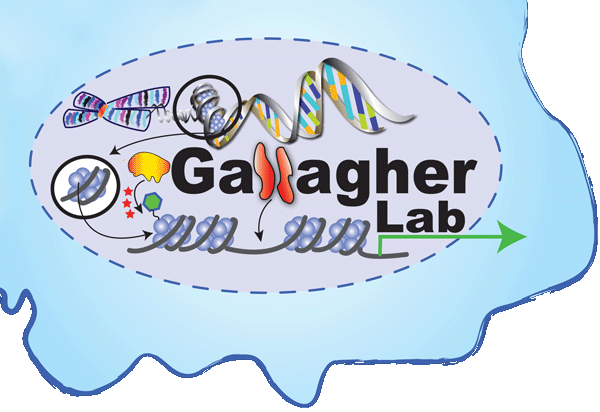People
Click on any image to view a person's bio.
Katherine Gallagher, M.D.
Katherine A. Gallagher, Professor of Surgery, Professor of Microbiology and Immunology, and the John R. Pfeifer Professor of Surgery at U-M, is well-known for her innovative translational research on epigenetic regulation of immune cells during normal and pathologic tissue repair and other cardiovascular disease processes. She is an expert in the molecular pathogenesis of tissue regeneration and has contributed substantially to the understanding of epigenetics in immune cells associated with tissue repair, diabetes, cardiovascular diseases, sepsis, and most recently, COVID-19.
She is a member of the National Academy of Medicine, American Society of Clinical Investigation, American Surgical Association, Society of Clinical Surgery, a James IV International Scholar, a Distinguished Fellow of the Society of Vascular Surgery, and a Taubman Scholar. Dr. Gallagher is also the Vice Chair of Basic and Translational Science in the Department of Surgery. She is the Chair of the standing NIH study section, BTSS, and is an original member of the NIH-NIDDK Wound Consortium. She is a tremendous mentor to junior faculty and trainees in medical research and has trained many post-doctoral residents to be the next generation of scientists, who have all achieved NIH(F/K) and major society funding (AHA, ADA, ACS, AAS/SUS, SVS). She was awarded the 2022 MICHR Mentor of the Year for basic/translational science mentoring efforts at the University of Michigan.
Gallagher received a Bachelor of Science degree in physiology and neurobiology from the University of Maryland in 1998, graduating with Highest Honors. She was a Howard Hughes Fellow at the NIH for two years. She graduated summa cum laude from the University of Maryland School of Medicine in 2002. She pursued her general surgery training at the University of Maryland, followed by her vascular surgery training at Columbia University in New York. During her residency, she pursued a post-doctoral research fellowship at the University of Pennsylvania. She has been tenure track faculty at the University of Michigan since 2011.
Her clinical expertise is in complex PAD and diabetic vascular complications, having previously directed the CVC multidisciplinary PAD clinic for many years. She currently runs a nationally known program for popliteal entrapment and other non-atherosclerotic pathologies associated with claudication/leg pain at the University. She is on the executive board for Vascular Cures and the Taubman Institute.
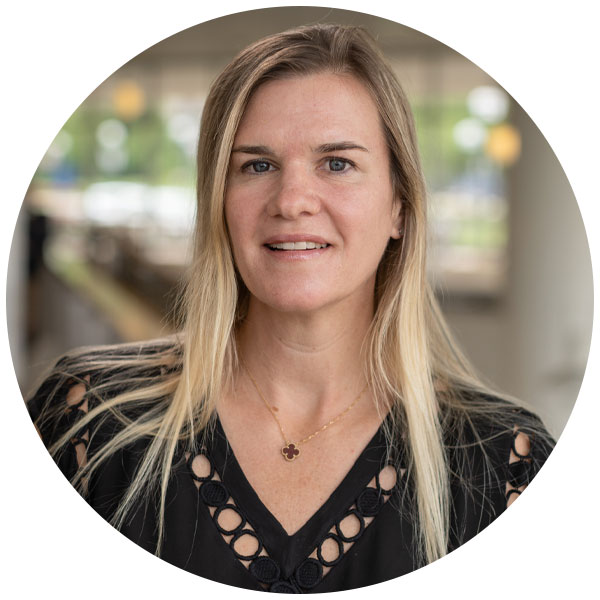
Dr. Katherine Gallagher, MD
Amrita Joshi, PhD, Research Specialist
Amrita Joshi completed her M.Sc. at University of Mumbai and received her Ph.D. from the University of Michigan in Microbiology and Immunology. Her research is focused on studying epigenetic regulation of immune mediators. In her spare time, Amrita enjoys reading, oil painting, and going on long walks.
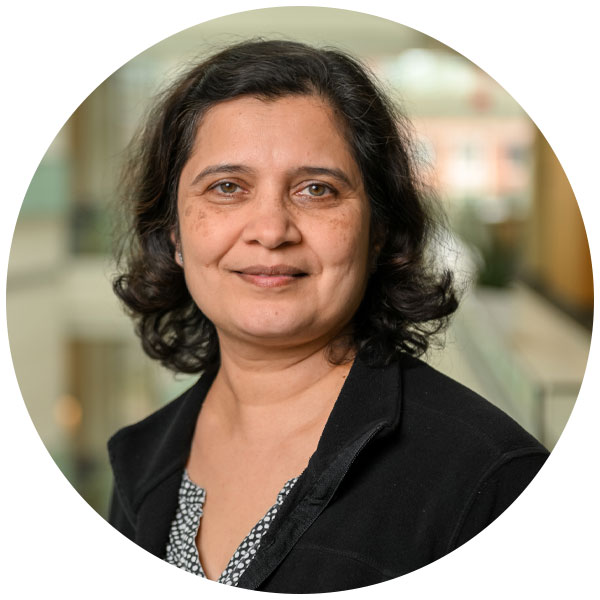
Amrita Joshi, PhD
Kevin Mangum, MD, PhD
Kevin is a vascular surgery resident at the University of Michigan, currently a post-doctoral fellow in the Gallagher Lab. His research focuses on epigenetic regulation of macrophage and smooth muscle cell phenotype in diseases such as hypertension, atherosclerosis, and wound healing. He is especially interested in identifying the epigenetic and transcription mechanisms whereby macrophages pattern smooth muscle cell phenotype and differentiation and how this contributes to disease. His expertise includes employing transcription-based assays to identify novel promoter-enhancer regions and protein-protein interactions relevant in vascular disease. Kevin completed his MD and PhD at the University of North Carolina at Chapel Hill. His hobbies include baking, bowling, and traveling.

Kevin Mangum, MD, PhD
Tyler Bauer, MD
Tyler is a general surgery resident at the University of Michigan in his dedicated research time. His research focuses on the epigenetic processes that effect abdominal aortic aneurysm formation. Tyler completed his undergraduate at Muhlenberg College and medical degree at Sidney Kimmel Medical College at Thomas Jefferson University. He completed a year-long research fellowship at the National Institutes of Health during his medical degree. In his spare time Tyler competes in road and off-road triathlons.

Tyler Bauer, MD
Chris Audu, MD, PhD
Chris is a senior resident in the Vascular Surgery Integrated Residency program at the University of Michigan, who spent his post doctoral years in the Gallagher lab. He returned to the clinical world in 2022 to complete the final 2 years of surgical training. He is especially interested in combining his interests in immunology and medicinal chemistry towards vascular pathophysiology. Chris completed his undergraduate studies at Purdue University, and medical and graduate school at Dartmouth. In his free time, he enjoys reading and spending time with family.

Chris Audu, MD, PhD
W. James Melvin, MD
James is a general surgery resident at Michigan Medicine. Originally from Ohio, he completed his undergraduate education in biomedical engineering at Johns Hopkins University and then completed medical school at the Ohio State University College of Medicine. James’ research interests include immunology, epigenetics, and pathophysiology of vascular diseases. He has earned numerous national grants and resident research awards.
In his free time he likes to make his daughter laugh, play with his dog, explore many of Ann Arbor’s running trails, and cheer for the Buckeyes.

W. James Melvin, MD
Emily Barrett, MD
Emily Barrett is a general surgery resident at the University of Michigan. Her research focuses on the epigenetic modification of fibroblasts in diabetic wound healing. Emily completed her undergraduate degree in Biology at Hendrix College and her MD at the University of Arkansas for Medical Sciences. Outside of the lab she enjoys pilates, attending live concerts, and reading romance novels.

Emily Barrett, MD
Jadie Moon, PhD Candidate
Jadie is a PhD student in the Department of Immunology at the University of Michigan. Her current research focuses on epigenetic regulation of keratinocyte function in normal and pathologic skin repair. Prior to joining U of M, Jadie graduated from the University of California, Berkeley in 2019 with a BA in Molecular and Cellular Biology with an emphasis in Immunology and worked at a biotech company called Xcell Biosciences in San Francisco for 2 years. Jadie's interests include rock climbing, baking, and cooking.

Jadie Moon, PhD Candidate
Sonya Wolf-Fortune, PhD
Sonya is a K99 postdoctoral scholar in the Department of Surgery at the University of Michigan. Her research focuses on the immunoregulatory role of keratinocytes during wound healing and how this is dysregulated in diabetes. Her research also focuses on elucidating the mechanisms by which psoriasis is linked to metabolic dysfunction development. Sonya completed her undergraduate at Prairie View A&M University and her Ph.D. in Immunology at the University of Michigan. She is also passionate about participating in DEI initiatives through the IRACDA program.
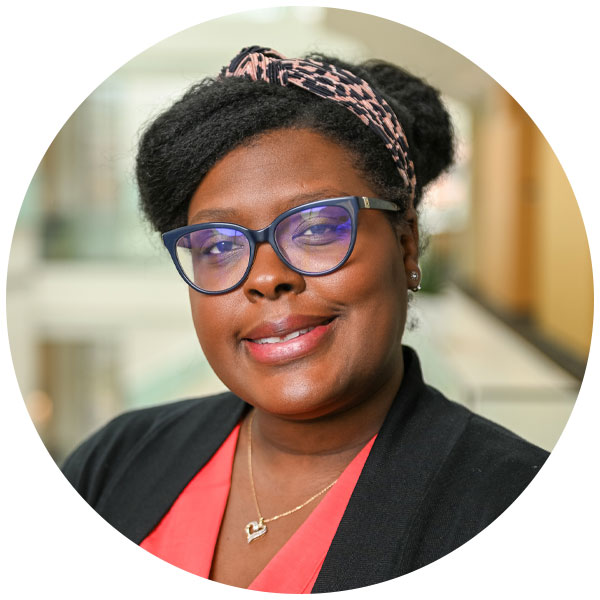
Sonya Wolf-Fortune, PhD
Sabrina Rocco, Research Lab Specialist
Sabrina is a research lab specialist, carrying out collection and preparation of in vitro and in vivo samples for use across various projects. She also aids in the management of the Gallagher mouse colony. She received her B.S. in Biochemistry from John Carroll University (Cleveland, Ohio) and her M.S. in Toxicology from the University of Michigan School of Public Health where she studied the role of cadmium exposure on breast cancer development. Outside of the lab, Sarin enjoys reading fantasy and sci-fi novels, going to see whatever musical she can find in town, and playing board games.

Sabrina Rocco
Purba Mazumder, Research Laboratory Technician
As a research lab technician, Purba manages the Gallagher mice colony and genotyping, while also assisting other lab members with their projects. Her current project looks at the epigenetic role of miR-144-3p in fibroblasts within diabetic mice models. Purba completed her B.S. in biological sciences at Wayne State University. Outside of lab, she is proud cat owner, and her hobbies include weightlifting, playing badminton, and trying out new cuisines.

Purba Mazumder
Asuman ‘Ilkim’ Erturk, DVM, Research Lab Specialist
Ilkim Erturk received her DVM from Istanbul University in 2001. She has in-depth knowledge of longevity studies involving mouse models of aging. She is excited to learn about pathogenesis of diabetic wound healing and other vascular disease. When Ilkim is not in the lab, she explores her passion for the arts by collecting Japanese art and as a serving member of the FAAC board at the Detroit Institute of Arts.
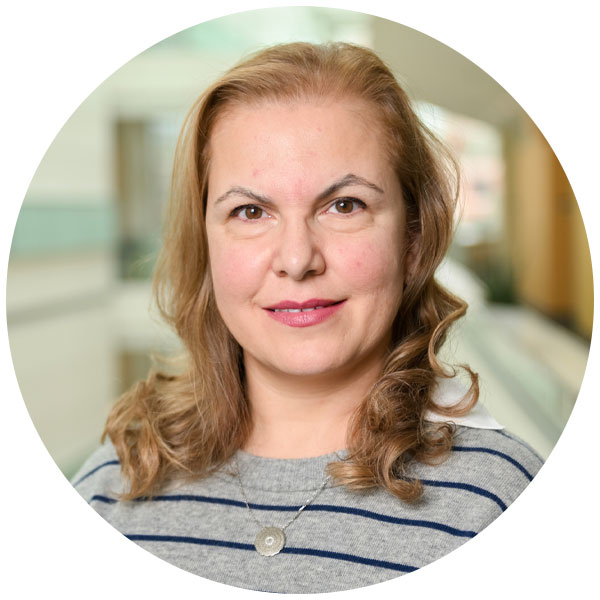
Asuman (Ilkim) Erturk
Frank M. Davis, MD Assistant Professor of Surgery
Dr. Frank Davis is a faculty member in the Department of Surgery Section of Vascular Surgery at the University of Michigan. He has a long-standing interest in vascular inflammation, epigenetic modification and abdominal aortic aneurysmal (AAA) disease. His laboratory focuses on defining the role of the immune system in the pathogenesis of aortic aneurysms. He previously pursued a Sarnoff Cardiovascular Foundation Fellowship at the University of Kentucky under the guidance of Dr. Alan Daugherty investigating the pathological mechanisms of abdominal aortic aneurysm formation. In addition, he spent two years as a National Institutes of Health Ruth L. Kirschstein Postdoctoral Fellow investigating the impact of epigenetic modifications to the immune system in diabetic wound healing and aortic wall degeneration.
Complete List of Published Work in MyBibliography
Twitter: @FrankMDavisMD

Frank M. Davis, MD
Andrea Tara Obi, MD, Assistant Professor of Surgery
Dr. Obi has a long-standing interest in disorders of thrombosis. Her laboratory focuses on defining the role of the immune system in acute deep venous thrombosis (DVT) and sequelae. The long term goal is to uncover mechanisms responsible for idiopathic and sepsis related DVT and identify new targets for therapeutic intervention. The widespread use of anticoagulants is risky and unsuccessful in completely preventing DVT and downstream effects such as post thrombotic syndrome (PTS). Since her arrival at the University of Michigan, she has focused efforts in both the laboratory setting utilizing various mouse models of DVT under different conditions such as pneumonia and sepsis to characterize thrombogenesis and the post thrombotic response on a cellular and molecular level. Importantly, this work was carried out in conjunction with clinical studies to ensure bench to bedside translation. The ultimate goal is to translate a better understanding of the intersection of innate immunity and thrombosis to new pharmacologic targets and treatment modalities.

